#ip tv box
Explore tagged Tumblr posts
Text
iptv satınal, iptv satın al, iptv satinal, iptv satin al, kurumsaliptv
IPTV (Internet Protocol Television), internet protokolü üzerinden televizyon yayını izlemeyi sağlayan bir teknolojiye verilen addır. Geleneksel televizyon yayınlarının aksine IPTV, internet bağlantısı kullanarak televizyon programlarını ve içerikleri izleyicilere ulaştırır. Bu teknoloji, kablo veya uydu gibi geleneksel yayın yöntemlerinden farklı olarak, yayınları dijital ortamda, kullanıcıların istediği zamanda ve formatta izleyebileceği bir sistem sunar.
IPTV'nin bazı temel avantajları şunlardır:
Talebe Bağlı Yayın (VOD - Video on Demand): Kullanıcılar, istedikleri zaman belirli bir içeriği izleyebilirler.
Canlı Yayın: İnternet bağlantısı ile canlı televizyon kanallarını izleme imkanı sağlar.
Zaman Kaydırma: Programları geri alarak izleme veya kaydedip daha sonra izleme özelliği sunar.
Farklı Cihazlarda İzleme: IPTV, televizyon, bilgisayar, tablet veya akıllı telefon gibi farklı cihazlarda izlenebilir.
Bu teknoloji genellikle IPTV hizmet sağlayıcıları tarafından abonelik bazlı sunulur ve internet hızınıza bağlı olarak yüksek kalitede video ve ses içerikleri sağlar.
#iptv satınal#iptv satın al#iptv satinal#iptv satin al#kurumsaliptv#iptv#ip tv#iptv smarters pro#iptv smarters#smart iptv#ip tv box#smarters iptv#guek iptv#2022 iptv#2023 iptv#2024 iptv#bedava iptv izleme#iptv free#4k iptv#m3u iptv 2023#m3u iptv 2024#set iptv#m3u iptv#smart iptv premium#tivimate premium#ip tv satın al#iptv tv#iptv smart pro#extreme iptv#iptv smart tv
0 notes
Text
I need you to understand if I can't buy a version of a media you are producing, I simply will not watch it.
"Subscribe to watch" is rent seeking behavior and I will not aid in your evil. I'm not going to pay you to watch the one thing I'm interested in on your shitty platform.
I AM going to buy a bigger external drive and pirate it like it's 2007 and I'm penniless.
#I'm getting real fucking tied of the 'subscribe to watch' model of TV#No I want to watch 1 or 2 shows that have insane fandoms not perpetually pay you only for the content I subscribed for to be yoinked#I'm big mad at the IP streaming nonsense wars#even services that used to allow password sharing are following the Netflix 'household' model#The only streaming service that gets a slight pass is Dropout#because I know in my heart Sam Reich wants there to be physical copies/boxed sets of media but economy of scale in not in his favor rn#also if I just wanted a digital copy (willing to pay for it) homeboy would be down for it
2 notes
·
View notes
Text
still mad about smart TVs. that shit should be in a separate box like you can literally buy one of them androidtv boxes for £30. it doesn't need its own ip address it doesn't need its own app store it doesn't need to replicate the functionality every device plugged into it already has
#daemon.md#sillyposting#brought to you by a girlthing who wants a fukcign dumb screen to plug a pi and sometimes her laptop into from bed
552 notes
·
View notes
Text
The other day, Nicolaï Chauvet aka Méko, original creator of Bunny Maloney/Pinpin le Lapin emailed me! Our email exchange unearthed a lot of interesting behind-the-scenes information about the show and the original flash pilot. I'll post the whole exchange and the photos he sent under the cut, but here's a quick summary.
He's been away from the internet for a while due to a back injury and is currently making a living designing collector's edition DVD box sets.
Bunny Maloney in its final form was intended to be a show for teens and up; he thought that was made clear, but Moonscoop and Kabillion clearly had other plans. He had no idea that the show was ever distributed for younger kids overseas. He received no royalties for the overseas distribution, either.
Pinpin le Lapin was not originally intended as a TV pilot, but after winning an award for it, he decided to alter the tone and presentation into something more workable as a TV program, the initial conception of which is shown in the images below.
He would like to continue the show, but since Moonscoop was dissolved, he's not sure who currently owns the IP and what they plan to do with it, if anything.
"Pinpin le Lapin" became "Bunny Maloney" due to the meddling of, quote, an "army of 40 year old Parisian mothers" who represented Moonscoop's executive board at the time. The name "Bunny Maloney" was chosen because they believed it would be more marketable to an American/English speaking audience. This "Mother's Mafia" is the entire reason that Bunny Maloney was watered down for a younger audience in the first place (although it certainly kept some of its edge).
And then he sent a bunch of pictures from the show's original pitch bible, which I believe has never been made public before!

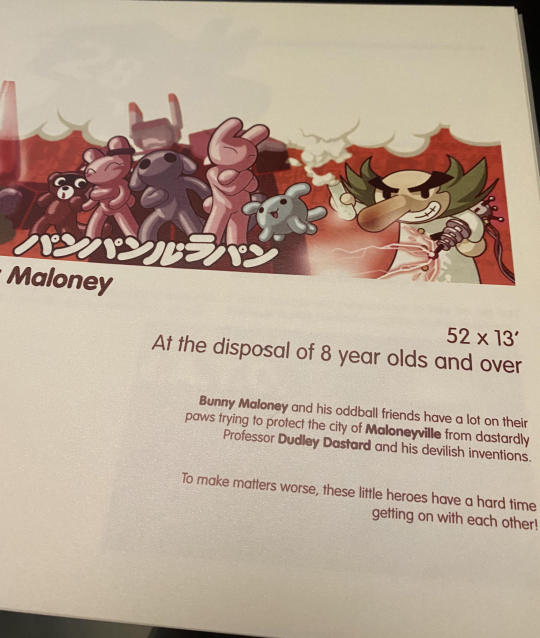

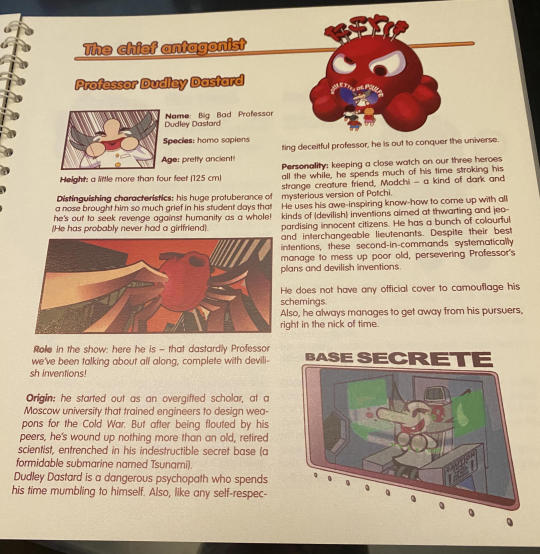
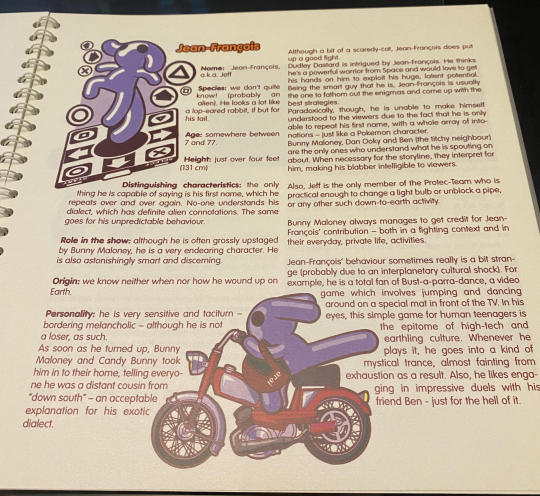


First email + new Charlotte illustration


Follow up email:






+ unexpected twist that Charlotte was meant to be a sheep all along!

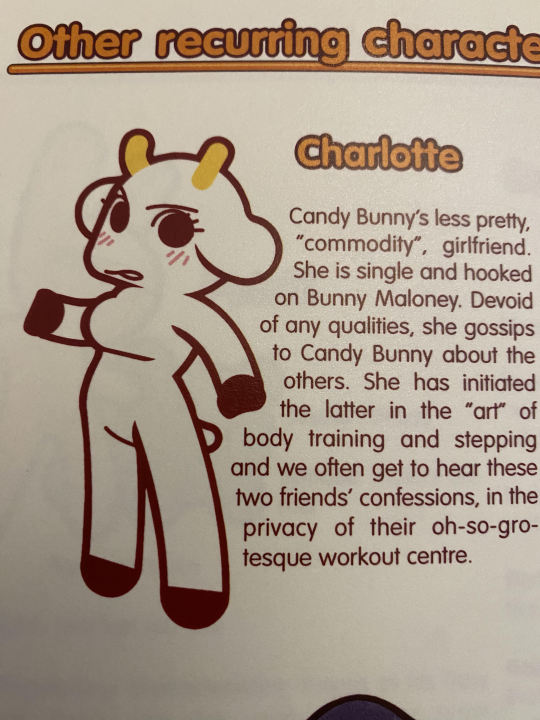
239 notes
·
View notes
Note
Y'know, I'm still salty that the DVD release is also kind of garbage
The set only has 54 of the 91 episodes. It ends on "The Darkwing Squad"
Yes.
They are missing 31 episodes in the series box set!
There are 2 volumes for the 54 episodes they gave us. THEY COULD EASILY PUT ANOTHER VOLUME IN IT FOR THE REST.
The box set was released in 2007, and was reissued in an environmentally friendly repackage in 2011. We have not received another series release since then. Not even a Blu-ray upscale.
The episodes are put in airdate order and not production order, meaning episodes are not in the correct order. That means the Justice Ducks two-parter is queued up BEFORE the debut episodes of QuackerJack, Liquidator and Negaduck, meaning that there is no context for them to exist before this.
Also means that "Toys Czar Us" is placed before "Whiffle While You Work", which, while the series isn't known for its strict adherence to continuity, means that QuackerJack's early-installment-weirdness depiction in WWYW is very off putting and strange to anyone who isn't aware this is the debut of the character, and it's really weird to go from TCU to WWYW
Actually, "Days of Blunder" is placed right BEFORE "Justice Ducks" on the DVD, when it should be AFTER TCU. QuackerJack is given his third episode before he's been introduced and is IMMEDIATELY dropped into the Justice Ducks narrative on the disc.
Literally, the DVD set is out of order, incomplete and the only saving grace is that the uncut version of "Darkly Dawns the Duck" is available there, but it's not like you can't find that elsewhere
Also
Also
The DVD menu is atrocious.
It starts out fine with some stock art and a loop of the instrumentals of the theme song, which is common for back then with these releases.
The episodes are separated under the episode select by splitting between commercial breaks/episode acts, which is fine. Numbered by episode, which is fine. Even though the episode numbering follows the airdate order and not the production code numbers, as should be intended.
The awful part comes in when Volume 2 is exactly the same, right down to the stock art, music, and numbers.
Yes.
THEY DID NOT UPDATE THE NUMBERING SYSTEM, SO EPISODE 28 IS MARKED THE SAME AS EPISODE 1 ON THE VOLUME 2 SET. ALL OF VOLUME 2 IS MARKED THE EXACT SAME AS VOLUME 1.
THEY AREN'T EVEN LABLED BY EPISODE NAME, IT'S JUST THE NUMBERS.
DISNEY, WHAT THE HELL. THIS IS HOW YOU TREAT YOUR BELOVED FRANCHISES??
Good news: there's finally a quackerjack funko pop releasing
bad news: he's apparently restricted to being a digital pop nft alongside liquidator???

im going to chew a hole in the wall and eat the load bearing support beams

This is the exact opposite of how he would have wanted his first actual toy merch to roll out
This is the worst timeline
#I also have a copy of TLK Signature Collection that somehow deleted Mufasa's clouds in the DVD disc for the combo box set#Disney has always been crap to its beloved IPs and we have no choice because there's no alternatives for our faves#Why do I have custom QuackerJack converse sneakers? BECAUSE DISNEY ISN'T GIVING US PROPER MERCH AND I NEED TO MAKE MY OWN#Meanwhile my Teen Titans DVDs were decaying from being a DC Kids edition set and WB released an “Archival” Blu-ray complete set#Said complete set for Teen Titans had every episode including the special half episode you got from a cereal box code that never aired#And even the TV movie#So Teen Titans which was still treated like crap still managed to get a beautiful upscale and the entire run including the non canon bonus#That series aired entirely in SD back in the day and didn't have an HD run and they made it HD quality with a wide screen upscale#That didn't even cut off any of the frames so they must have found master files and reformatted to give us more visuals#Meanwhile with DWD the episodes WWYW and DoB look like they're falling apart in the footage with those washed colors and black bar on bottom#Why did WB treat thier series with more love than Disney did with DWD??#I'm not even gonna go on about the 2011 comic fiasco either#Seriously I will die on the hill that Toy With Me is just beat 4 beat The Killing Joke and also QJ isn't the only character they screwed up#I could rant about how Negaduck was also totally out of character too#And the stuff BTS there really adds context and poor QJ was basically used as a visual chew toy between two men arguing over thier egos#2011 QJ deserved better#Literally the entire plot of the 2011 comics HINGE on QuackerJack's suffering#And you can't remove him from the narrative because the entire plot will crumble#The entire 2011 comic continuity exists to break him down and make us watch the resulting spiral#long post#long post is long
88 notes
·
View notes
Text
Summary:
He realizes she hadn’t come back before disappearing. Fuck. He lets his body drop on their couch and squeezes his phone so hard between his palms like a stress ball. How’d he come to fuck ip his life so bad he had no idea. He had never been the brightest crayon in the box when it came to shit like love, Claire was so easy and he had to do almost nothing to get her. Sydney fucked him up so bad he felt losing her in the center of his chest. His breath began shortening and his eyes started to water as the panic set in. What had he done? Moments of his entire life with Claire and the expectations from everyone around him smothered him. It felt like bricks sitting on his chest and the only time he felt alive was with the little chef from Chicago. He gripped Sydney’s blanket that she left on the couch between his fingers. Bringing the soft fabric to his chest as uneven breaths released from his lungs. He inhaled slowly. Allowing her unmistakable scent of cocoa, vanilla, and lavender fill his senses until his breath evened. His mind cleared as he hugged the blanket tight to his chest. His choice was made. He picked up his phone and searched for the earliest flight to Chicago.
Hi cousins!! We're in the endgame now! Enjoy Part 1 of 2 of the finale! Part 2 is already written so the wait won't be long for the actual conclusion!
tagging my cousins for showing me hella love during the wait: @sydneys-adamu @falllpoutboy @thehouseofevangelista @turbulenthandholding @anxietycroissant @devisrina
29 notes
·
View notes
Note
I recently read an article in which Quentin Tarantino stated that fewer movie stars exist as a result of "Marvel movies in Hollywood." I think Jennifer Aniston made a similar argument before saying that there are no longer any movie stars. I'm not sure what that means. I can think of a lot of movie stars right now, such as Zendaya, Timothee Chalamet, and Zoey Deutch etc. what do you think? I'd love to hear your thoughts on this and Quentin's comments.
QuillBot's
Months ago, when you sent me this ask, anon, I wrote out a really long reply and as soon as I hit post, my laptop crashed and ate the answer, and I was so annoyed at myself for not saving my reply, that I couldn't bring myself to try and re-write an answer. I'm really sorry for that, especially because I think this is such an interesting ask (or well, two asks, because I think the death of the movie star and the impact Marvel's had on the broader concept of a movie star, are kinda two different things).
I've been thinking about it a bit again recently though, particularly as the Oscar race gears up, and Jacob Elordi and Charles Melton''s respective stars are rising in an industry currently desperate to find the new young Hollywood male 'talent', and I've been thinking about it again because honestly?
I agree with Jennifer Aniston, I think the movie star is dead.
We are a long, long way from Golden Age Hollywood where actors like Cary Grant and Marilyn Monroe could captivate a public imagination in a way that translated to big box office effect, after all. Hell, we're even out of New Hollywood, an era dominated by names like Al Pacino, Jack Nicholson, and Jane Fonda, and the Blockbuster era with Tom Cruise, Sylvester Stallone and Harrison Ford.
My original reply went into a lot of the different reasoning as to why this is (like with many things, I don't think there's any one reason for it), in particular how the advent of streaming has changed our relationship with films and TV shows, how the saturation of the market has diluted the staying power of celebrities, how social media and the perceived accessibility of celebrities removes personal mystique which in turn removes intrigue and increases a sense of entitlement, and the fact that so many people having stopped going to the cinema means that the experiential element of seeing a film in a setting larger than life has been diminished.
I think call out culture plays a role too, with any actor on the rise being torn down by tweets they made eight, nine or ten years ago impacting how their star rises, I think the dismantling of the studio system (which is a good thing!) also harmed actors in the long run as studios stopped investing the same resources into making and training stars (they used to be able to sing, dance and act! Now some can barely even act!), and I think, of course, the rise of prestige TV changed the industry substantially (after all, movie stars were movie stars - they traditionally did not, and would not, do TV, which created a clear class structure in terms of screen-based storytelling).
And yeah, I think the language shift from film and TV to content has done irrepairable damage to the artistry of filmmaking and the consideration of a movie star as an actor at the top of their field instead of an actor with the most Insta followers or YouTube subscribers (after all, if everything's content, isn't it the same thing? [no lol]).
Which I guess is kind of where Quentin Tarantino's argument comes in, right? What he's saying is that Marvel's made it so that the IP - the content itself - is the star, not the actor, and I'd say he's probably right with that.
Think of it this way - back in the New Hollywood/Blockbuster era, Harrison Ford was the movie star - he was leading new franchises left-right-and-centre between Star Wars and Indiana Jones, sci fi epics like Blade Runner, leading action thrillers like Patriot Games, The Fugitive and Clear and Present Danger and getting nominated for Oscars for Witness.
He was a movie star in every sense of the word because you could hinge a film - one with a new concept, not just remakes or sequels - on him and be virtually guaranteed a success. He was what sold the tickets, the director just hopefully had to make something good enough people would leave the cinema glad they saw.
Tarantino's argument is the Marvel model - - hell, even the new Star Wars properties, turned the franchise into the star, for better or worse, which means original films can't compete because nobody knows the IP. Back when Harrison Ford was at the top of his game, his name was what helped original films including smaller, standalone works like Witness find an audience, but the studios have changed that. Capitalism has changed that.
Properties with existing audiences and deep pockets for merch were prioritised, only now those franchises are faltering and you've got a generation trained that 'cinematic events' are reserved for blockbusters in established universes, instead of taking a risk on a new film because you know you love an actor who's in it.
Do I think we could go back?
Maybe, but probably not.
I think the place we are now in the history of cinema / TV / 'content' means you can't make a movie star anymore because I think the industry is simply so different that no actor can break through in the same way that even Leonardo DiCaprio could 30 years ago. That industry doesn't exist anymore, actors aren't guaranteed draws (Bones and All proved that for Timothee Chalamet, and Wonka I think could go a similar way), or they have to heavily rely on other industries to become household names which I think dilutes them as a pure 'movie star' (Zendaya's a great example of this - I like her a lot, but how many movies has she even been in? They built her career up in peripheral industries long before they tried to sell her as a movie star, and frankly, I'd question her even as a leading actress yet given she's typically only either been in ensemble casts or clear supporting).
It's a whole new world, and yeah, I think the movie star is dead.
#i hope this makes sense haha#it's an interesting topic#and a shame really#i also think there's a difference between being famous online and a movie star#like zoey deutch i really like and i know film twitter likes her#but she's b-list at best and i doubt she has any broader name recognition unfortunately#whereas timmy and zendaya defs do#but even their star power isn't working#dune did well because of tarantino's argument#the ip is the star#challengers will be the real test for zendaya#and wonka will be timmy's biggest one#because bones and all tanked but is a) genre and b) indie#don't look up french dispatch and little women were all ensemble#so yeah#wonka will defs be interesting to see#film asks#welcome to my ama
85 notes
·
View notes
Text
Pacific Rim Is Stomping Onto TV With New Prequel Series

An 'origin story' series for Legendary's giant mecha franchise is part of a new TV deal between the studio and Eric Heisserer.
By James Whitbrook [gizmodo.com]
The world of Pacific Rim is making a giant-robot-legged leap to the small screen. Variety reports that Legendary Entertainment and Shadow and Bone‘s Eric Heisserer are teaming up on a new TV series set in the world of the kaiju-vs-mecha franchise.
“We are thrilled to launch our partnership with Eric, Chronology, and Carmen [Lewis, co-founder of production company Chronology], with a new entry in the epic, globally popular Pacific Rim universe,” Jason Clodfelter, president of Legendary Television, said in a statement provided to Variety. “We are certain their vision will make for an enthralling expansion to Legendary’s beloved franchise.”
The Pacific Rim series will be the first in Chronology’s first-look TV deal with Legendary, designed to “develop and shepherd IP-driven and related projects” for the studio, according to Variety.
Little was revealed about the series, other than that it will act as an “origin story” for the franchise. Set in a near future where much of the world has been devastated by the emergence of giant monsters called Kaiju—flooding into the world via an interdimensional rift discovered in the Pacific Ocean—Pacific Rim follows the establishment of the “Jaeger Program,” an international military force that develops giant robots operated by multiple pilots with their minds synced together. The first Pacific Rim movie launched in 2013, and was followed by a maligned sequel, Uprising, in 2018, but the franchise has flourished beyond the box office since, with the Netflix anime Pacific Rim: The Black and several comic series.
Whether or not the series will cover the early days of Kaiju-kind’s appearance on earth, or the development of the Jaegers and their initial battles against the monsters, remains to be seen. But if Monarch: Legacy of Monsters proved you could do the kind of scale and scope of Legendary’s other big monster series, Godzilla, on a streaming series budget, then maybe there’s hope for a lot of fun monster and robot action here, too.
22 notes
·
View notes
Text
I think the reason why you often see more game/show/movie announcements for a random Marvel character you never heard of where DC primarily focuses on Batman and Batman related characters is because...Marvel built more trust with the obscure.
All the way back when they started the MCU, Marvel didn't have the rights to its more iconic, recognizable, and, more important, marketable characters. Spider-Man went to Sony, X-Men and Fantastic Four went to Fox, and even the Hulk was technically owned Universal. By the time the MCU was being conceived, Marvel only had its C-listers and D-listers. No one even HEARD of characters like Ant-Man, Doctor Strange, and ESPECIALLY the Guardians of the Galaxy before the MCU. Even characters like Iron Man, Captain America, and Thor, characters considered Marvel's big three nowadays, characters who the MCU relied on, weren't as huge as DC's big three. Meanwhile, DC had access to ALL of its characters, relying on its most recognizable IPs like Batman and Superman...And, oh yeah, I guess Wonder Woman was there too...Sometimes.
But the biggest seller was always Batman. Because how could he not be? He looked cool, he had an impressive rogues gallery to make toys of, and is everything for DC as Spider-Man was to Marvel. Both Batman and Spider-Man could sell anything. But Marvel technically didn't have the FULL rights to Spider-Man and DC...didn't bother with its other characters. Batman made bank with his videogames, movies, and TV shows to the point where they could sell a Gotham prequel series to Fox and STILL make a lot of cash. Why bother making a movie about Aquaman or The Flash when it likely won't sell as well as BATMAN. Sure, you got a Green Arrow TV show on the same network as a Superman prequel series, but that didn't change how most of DC's other projects weren't connected to Batman in someway.
Teen Titans was a show that starred Robin, Batman's sidekick. Same with Young Justice. And the only time kids got introduced to other DC characters, it was for a campy show like Batman: The Brave and the Bold where BATMAN teamed up with a hero a week. Which would have been a smart way to bring other characters into the light, but it's still connected strictly through BATMAN. Even now, DC has what is best described as a Batman problem. The Flash was a movie that featured two versions of Batman, one of them bringing in nostalgia through a past Batman movie instead of focusing on an old Flash product. And with the last few years, the only video games were Batman related, with Gotham Knights starring Batman's sidekicks and that Suicide Squad game starring Harley Quinn, a BATMAN villain who goes to kill BATMAN that's actually the same BATMAN from an old BATMAN game.
And yeah...I love Batman. We ALL love Batman. He's the coolest character ever conceived and it's the easiest thing in the world to make a movie about him. It might not be a GOOD movie sometimes, but it's at least a movie that'll make billions. But with this over-saturation of Batman, it left DC unsure if they can make anything big WITHOUT him. Because how can they be sure it'll succeed without their signature character that gave them a shitload of money?
But let's go back to Marvel. Starting a cinematic universe without their most popular IPs was a risk. They SORT of had the rights to the Hulk, but...there was no way Hulk would have made more money than a Spider-Man movie. If they wanted to make a successful franchise, Marvel had to put more faith in its other characters, allowing to make good movies and hope that enough people would be interested to see more. And...it worked. Iron Man was a hit, Thor and Captain America got people interest, and the big pay off was the box office smash that was The Avengers. Everyone started to know these characters and it didn't stop there. Guardians of the Galaxy became popular enough to be another big franchise for Marvel, Black Panther became the most popular Black superhero after Blade (another Marvel character), and people were left BEGGING for Spider-Man and the X-Men to join this universe so they could see their old favorites interact with their NEW favorites. And that just...never stopped. Marvel kept pushing more and more characters to the spotlight, with it paying it off for them.
Before 2014, NO ONE would consider buying a Guardians of the Galaxy game. But due to the MCU's revamping of those characters, it was enough to make people willing to do so. And in a few years, we're getting games based on Iron Man, Captain America and Black Panther, and JUST Black Panther, all because the Marvel had enough faith to turn this C-listers into A-listers. As for TV shows, we've got connected MCU stuff like Moon Knight and Ms. Marvel, but also a really good and imaginative cartoon with Moon Girl and Devil Dinosaur.
Now, to be fair, it's not paying off for Marvel, especially with Ant-Man and the Wasp: Quantumania and The Marvels causing the studio to lose bank. They're even thinking about cutting back on riskier stuff and focusing on their bigger franchises. Which...honestly sounds dumb to me not only because the MCU was founded on taking risks, but also because DC is exactly what you get when you focus on JUST the money makers. We're still getting nothing but Batman and Batman related characters or movies/universes that references nothing but Batman. To the point where I just want DC to retire Batman for a year, maybe TWO tops. Marvel proved that you can make a hit if you let other characters than the most marketable one. Even if it fails like The Marvels did, it's not because Captain Marvel isn't as iconic as Iron Man, it's because the movie wasn't as well-written enough. It was a fun time, sure, but not as strongly written as other MCU films. And that's what DC needs to learn and Marvel to remember: It's not about who's the most popular, it's about strong writing.
Hopefully we get more attention on lesser-known Marvel and DC characters in the future.
26 notes
·
View notes
Text
When Jim Henson was still alive and making creative decisions for the Muppets, I could believe that the characters were real. I mean, I know they're just pieces of fabric puppeteered by voice actors, but the performances were so genuine that any cameo or talk show appearance by a Muppet could briefly convince me that I was looking at a real talking frog or pig or monster giving a real interview. But nowadays, whenever I see the Muppets I can only picture them as soulless corporate mascots.
Think of Dr. Steve Brule. He's not real, he's just a character played by John C. Reilly, but I can suspend disbelief long enough to accept that he could be a real local public access tv host. I look at some characters and can only see their actors (Indiana Jones and Han Solo are iconic, but be honest, they're both just Harrison Ford being Harrison Ford), but I look at Steve Brule and I don't immediately see John C. Reilly. And I don't see a Warner Bros character either, certainly not a mouthpiece for David Zazlov himself, I just see Steve Brule. Same thing with all of Sasha Baron Cohen's characters. I know they're all just him in wigs and fake beards, but his performances are so varied and so in-depth that I buy them all as individuals. I don't even know what studio he works for, what company owns the copyrights for Borat or Ali G or that one show where he got Republicans to drop their pants and scream the n-word. Those characters are fictional, but they feel independent.
The mainline Muppets are owned by Disney and the Sesame Street characters are owned by Warner Bros, and that's all I can see now. When Elmo gets on board a social media trend or shows up in some influencer collab I don't see a little monster guy having fun with his friends, I see a Warner Bros executive signing off on a scripted appearance of a character they own for what is essentially a commercial. Kermit the Frog is not a beleaguered comedian/talent manager, he's just a Disney product with a replaceable performer who is just as fake as Mickey Mouse or Disney World princess actors (I will be deep in the cold ground before I call them "cast members...") Even when they're allowed to improv, the Muppets feel like they exist in a box with strict guidelines for how far their performances are legally allowed to stray from corporate mandated archetypes before the lawyers tell them to reign it in to maintain the integrity of the IP. Every character feels the same to me, just with different voices. All the jokes feel stock.
#the muppets#sesame street#movie magic#hollywood#characters#actors#puppets#mascots#performers#corporations#disney#warner bros
7 notes
·
View notes
Text

iptv satınal, iptv satın al, iptv satinal, iptv satin al, kurumsaliptv
KURUMSAL İPTV KİMDİR ? İPTV SATIN AL
IPTV Sektöründe Profesyonel, Kurumsal Hizmet, Satış ve 7/24 Teknik Destek Sunuyoruz.
İPTV alanında 8 yıllık deneyimle, sizlere kesintisiz ve güvenilir bir hizmet sunuyoruz. Şirketimizin temel amacı, kaliteli İPTV hizmeti sunmak ve müşterilerimizle kalıcı bir birliktelik kurmaktır. 8 yıllık deneyimimizle, İPTV ihtiyaçlarınıza profesyonel bir yaklaşım sunuyor ve kalite konusundaki taahhüdümüzü kanıtlıyoruz.
IPTV Sektöründe devamlılık çok önemlidir. Bu nedenle Kurumsal İPTV hizmetlerimizde 8 yıllık deneyimimizle, güvenlik, teknik destek, ve kaliteye odaklanıyoruz. Müşteri memnuniyetini öncelikli tutarak, her türlü güvenlik testini ve dayanıklılık testini düzenli olarak gerçekleştiriyoruz. Müşterilerimize en iyi hizmeti sunabilmek için İPTV ve güvenlik konularında uzmanlaşmış bir ekiple çalışıyoruz. Ayrıca, İPTV hizmetinin kurulumunda ve sorunlarınızda ÜCRETSİZ teknik destek sunuyoruz. İnovasyon ve genişleme hedefimizle, her geçen gün daha fazla kanal ekliyoruz. Kanallarımızın kendi sunucularımızda ENCODE edilmesi, gecikmeyi minimuma indiriyor. Müşterilerimize güvenilir ve kesintisiz bir İPTV deneyimi sunuyoruz.
#iptv#iptv satınal#iptv satın al#iptv satinal#iptv satin al#ip tv#iptv smarters pro#iptv smarters#smart iptv#ip tv box#smarters iptv#guek iptv#2022 iptv#2023 iptv#2024 iptv#bedava iptv izleme#iptv free#4k iptv#m3u iptv 2023#m3u iptv 2024#set iptv#m3u iptv#smart iptv premium#tivimate premium#ip tv satın al#iptv tv#iptv smart pro#extreme iptv#iptv smart tv#iptv list
0 notes
Text
One Frame At A Time
An Article about LAIKA's upcoming film, Wildwood, from Empire Magazine. Transcript by Rampage for visibility.
"THIS MONTH I found myself in a staring contest with an owl. (Spoiler: I lost.) It's not every issue this happens, but then again, it's not every Issue you get to go to Portland, Oregon for a visit to the stop-motion magic factory that is Laika. Portland itself may have been a bit of a let-down, in that I didn't encounter a single Carrie Brownstein or Fred Armisen (if you haven't watched Portlandia, do so immediately), but there was nothing disappointing about the place behind Kubo and the Two Strings and the upcoming Wildwood, the movie that will feature said bird. It was a total treat to get a glimpse of their new animated epic coming together (though the box of tiny puppet eyeballs might haunt me for a while). Head to page 66 for our report.
Wildwood isn't out until 2025 (there's no rushing a puppet owl), but this issue also dives deep into more imminent excitement…"

"Laika isn't just a studio, it's a way of life. As the masters of stop-motion animation painstakingly put together their biggest project yet, we visit their Portland HQ to discover their slow-moving secrets."

"The Dogfight was going to look awesome. The boy was sure of it. Buzzing from the movies he had sat through, enthralled, on Saturday-morning TV or at cinema matinées in his farm town outside of Portland, Oregon- stop-motion classics such as Ray Harryhausen-enhanced The 7th Voyage of Sinbad and Rankin/Bass' Rudolph The Red-Nosed Reindeer- he had already attempted to inject life into Star Wars action figures. Now, it was time for something a little more spectacular. He marched to his X-Wing toy, like a titchy Wedge Antilles, grasped it in his eager hands and proceeded to film it, frame by frame, soaring through the sky, little explosions created using balls of cotton. His mind boggled at how incredible it was going to look when he unveiled his final cut. "Well, it looked like garbage." laughs Travis Knight now. "I was like, 'I'm going to have this amazing aerial battle here!' It was so fun to imagine what it could be. And then you see the end result, and it wasn't what you imagined. So that was heartbreaking."

Flash-forward some 40-odd years, and Knight is still tinkering with his toys. He's still just outside Portland, Oregon except now those toys are no longer purchased from the nearest Walmart. And, rather than his parent's basement, all alone, he's in a giant warehouse complex, assisted by roughly 400 ridiculously talented people. This is Laika, the studio behind the likes of Coraline, ParaNorman, and Kubo and the Two Strings; 964 miles up the coast from Hollywood but light years away in terms of how things are done. No sequels, no chatter about "IP". Productions that are not rushed through the system like fast food, but baked like gourmet dishes in a clay oven. Their new stop-motion epic, Wildwood, has been in development for 12 years; it's finally due out in 2025.
It's not always been smooth sailing here, but this is still a place where dreams come true.
Very, very slowly.
"I have a big aerial scene in this movie, with a giant bird," smiles Knight. "So, you know, good things come to pass.""

"There's a go-kart track around the corner from Laika, called K1 Speed. Every now and again, somebody from the studio will head there, clamber inside a buggy and hit the throttle, hard. Whizzing around a circuit at high velocity is a form of recalibration. Because at Laika, despite the presence of an in-studio coffee shop called Dripster's (named after a location in Wildwood). things move at, well, puppet pace.
When Empire visits the studio in early April, it proves to be the quietest set visit, by far, that we've ever experienced. The usual sounds of a busy shoot- walkie-talkies, clapperboards, Michael Bay yelling at a grip - are absent. In fact, it's hard to detect any activity at all. But as we stroll around the hushed, 400,000 square-foot warehouse complex, we find incredible things happening behind curtains. A massive eagle, wings outspread. A study, complete with marble fireplace and grand piano, the dwelling of an oversized owl. Forest tableaux with tangled trees and creeping ivy. All in miniature, and precisely put together by hand or using nifty tech: even the tiny leaves for the foliage have been laser-cut. And rather than a bustling crew gathered around the camera at each micro-set, there's just a single, hyperfocused person. "Until we shout action, you'll have set dressers, cameramen, motion control, lighting, gaffer, and somebody from puppets doing final checks," says Laika's Dan Pascall. "But as soon as we get launched, everyone's out and then the animator's in there. I mean, for a 20- or 30-second shot they can be in here for months on their own. It's a pretty solitary thing."
Wildwood is a fantasy epic directed by Knight, based on a book by Colin Meloy, frontman of the band The Decemberists, it's a sprawling tale that's actually set in and around Portland, in which a young woman, Prue McKeel, finds herself in an enchanted forest world. On the day of Empire's visit, there are 25 animators working on the project. But those animators are hidden away and silent, like monks in prayer, rapt in focus over the tiniest of details. When we encounter Jason Stalman, who's worked on Laika productions since 2012's ParaNorman, he's attending a throne room the size of Prince George, concentrating on the puppet of a female character who is reacting to something in the scene.
"She's doing very little, but you have to keep the character alive" he explains. "She's trying to be alluring, so she's doing all these little movements and body adjustments, which is really hard to do." Another challenge is her dress, which has to move independently too. The solution: tiny foam pads beneath the dress, to which the fabric can be pinned to, creating- eventually- the illusion of a swishing, real-looking costume.
Creating a performance frame by frame requires an enormous amount of mental energy.
"It's Strange; it takes you a minute to come back to the normal world after you've done a day of this," admits Stalman. "People could think, 'how the hell do you do it? it's so boring.' But I like it, because the world is so crazy and fast. This feels nice, to do this little, delicate thing."
One animator at Laika is likely to, in a week, create three-and-a-half [3 ½] seconds of screentime. That's the kind of stat that might prompt some studio executives to kick over a watercooler in frustration. But Knight knows from experience that you can't rush these things.
Puppets move at their own tempo. "You could take shortcuts," he says. "But to me, the film requires whatever it requires. I do think making a movie like this is stupid. It's the stupidest way to make a movie. It's harder, there's more pain. But I also think there's more joy as well. I'm aware of the ticking of the clock and the mortal coil and everything else. I do want to tell as many stories as I can before my time is done. But when this group of people come together to create something, it's the most satisfying thing I've ever been a part of.""

"Back in 2009, stop-motion was on life-support (quite possibly hooked up to a tiny, hand-crafted IV). Tim Burton's Corpse Bride had barely made its money back a few years earlier, but nobody in Hollywood was baying for more. And advances in CG animation had led to studios looking for the next Shrek, not the next Nightmare Before Christmas. "Stop-motion has always been the red-headed stepchild of animation" says Knight. "And CG could effectively do everything we do in stop-motion, but better. There was certainly a moment where I think any of us who were practitioners of the craft were asking ourselves, 'Is there a future here?'"
But he, and others were deeply in love with both the process and the vibe of stop-motion. Knight, whose father is Nike magnate Phil Knight (as played recently in Air by Ben Affleck), had abandoned plans for a career in finance, deciding to follow that passion, wherever it might lead him. And it led him (after a brief stint as rapper ‘Chilly Tee’) to Laika- formerly Will Vinton studios which Phil Knight acquired in 2002, Travis becoming CEO. Laika is the name of a dog sent into space by the soviet union in the 1950's; Knight's career choice seemed as daunting an odyssey as that of the cosmic pooch. Especially when the studio embarked on its first feature film, Coraline, directed by The Nightmare Before Christmas' Henry Selick and on which Knight worked as lead animator. Not only were financers reluctant to back a stop-motion animation, but they proved unenthusiastic about the lead character being female- and not a Disney princess, but a regular teenage girl. Despite it being based on a book by Neil Gaiman, despite Selick's pedigree, despite the stunning visuals that Laika was orchestrating, the mood was grim. "There was a lot of anxiety," remembers Knight. "When we were trying to find partners who understood what we were trying to do, we were getting nothing but rejection. It was like high school all over again."
Then, at the premiere the weekend before it came out, a studio executive approached him. "According to the data it was going to bomb tremendously. And I remember an exec put his hand on my shoulder and said, 'I'm sorry. You gave it your best shot.' In this moment where we're trying to have this big celebration of what the crew had created, it was just tainted by this fact that it didn't work, and we were going to fail."
But it did work: after a surprisingly strong opening weekend, Coraline found legs, going to make $125 million. "Fast-forward a couple of months from the premiere, and that same executive team was asking me to make 'Coraline 2'," Knight recalls, "I was like, 'No, we're not gonna make Coraline 2. We're gonna tell a different story.'" Laika were off and running. Their follow-up, 2012's ParaNorman, was a zesty zombie comedy. 2014's The Boxtrolls was a raucous romp featuring mischievous creatures and industrious quantities of cheese. 2016's Kubo and the Two Strings, Knight's directorial debut, was an elegiac stop motion samurai epic. And 2019's Missing Link was a massively fun riff on Around The World In 80 Days, with a male Sasquatch named Susan. The studio's fare has remained artisanal, original and eccentric. And while the box-office figures have not been astronomical, those who do see their films tend to treasure them. In fact, some viewers became so inspired that they've ended up as employees at Laika themselves. "There are people who saw ParaNorman who work here now." Says the studio's head of production, Arianne Sutner, "Same thing with Coraline. You know, we don't make tons and tons of stuff, but what we have has a special impact. People love it for all its unusualness.""

"In Laika's 'Story room', where Empire meets Knight, bookshelves teem with thick volumes: subjects include P.T. Barnum, Art Deco, Cape Cod houses and fashions of the Victorian age. In a cabinet, meanwhile, are DVDs, many of which seem like unusual references for an animated adventure: the documentary Fires of Kuwait, The Lord of The Rings, The Birds, Micheal Clayton, Wong Kar-wai's The Grandmaster. "The Grandmaster is a beautiful film." Knight enthuses. "That was a huge inspiration when I was working on Kubo, because of how gorgeously it was shot. Micheal Clayton is more to do with lighting and composition, that sort of thing. But yeah, we pluck inspiration from a variety of sources." The stop-motion process is intrinsically difficult and time-consuming: boxes of replacement faces (each bearing a unique code) are trolleyed to set to create every smile, smirk and splutter. Nine 3D printers work overtime to make moulds of characters, which are then dressed with bespoke costumes, fitted with wigs and prepared for their moment in the spotlight. The quantities required are mind-boggling: Missing Link called for 106,000 unique faces; Wildwood will have far more, while also boasting 120 sets, double the number built for Kubo. But Laika is determined to keep crashing through the technical obstacles encountered, in a quest to become ever more cinematic. For Kubo, the studio tackled water, a giant skeleton and origami animation. For Wildwood, Knight is thinking bigger. He has the benefit of being fresh off his first live-action venture as director, 2018's Bumblebee, the best film in the Transformers franchise to date. And he's brought on cinematographer Caleb Deschanel, veteran of such non-puppetry epics such as The Right Stuff and The Patriot. With the rest of the team, they're making innovations both large and small. They've cracked a way to put muscles into puppets' arms ("We've never done that before," says Knight, "it looks amazing when I see it on-screen") and to create a fully articulated rat puppet so miniscule that it can rest on your pinkie ("The joints are so small - if you drop it, it looks like a human hair"). Most dauntingly, they are orchestrating a vast battle sequence, which would make Jason and the Argonauts' skeleton brawl look like a pub barney. "It's the single most difficult thing we're tackling on this movie." Says Knight. "We're starting to chip away and tentatively stepping into, like, 'Oh God, oh God, oh God, how are we gonna do this?' But I think it's going to work. And you'll tell me when the film's done if it did. Stop-motion films tend to look like they're shot on a table-top, because they are. Moving a physical object one frame at a time and trying to give it life, that's its own challenge. And then you bring all the kineticism you would have in a live action movie... it's so hard."
Spectacle is one thing, but Laika's filmmakers are equally focused on their characters. Hailed for their progressiveness and inclusivity, they have brought the world Coraline Jones, a female animated hero like no other. ParaNorman's Mitch (voiced by Casey Affleck) was mainstream cinema's first openly gay character, leading to Laika being nominated for a GLAAD award. And they're determined for Wildwood's characters, including Prue, another young female hero, to connect powerfully with viewers.
To create nuanced puppet performances, Laika animators study live-action ones. "There's a moment in Dangerous Liaisons with Glenn Close on a sofa, and John Malkovich is asking her, 'What's your story?'" says Jason Stalman of a touchstone for the scene he's animating today. "The way she delivers her lines- I'm getting the shivers - I'm reacting so much to that that I thought if I could get even one tiny piece of stardust from that and put it into this, I'm going to try. It's nice to show a thought process happening in a two-inch piece of plastic head."
The animators also study themselves. Study their colleagues. And even their own families. "The design of the little baby in Wildwood is actually based on my nine-year-old son. That's how long we've been developing this damn thing," reveals Knight. "But he's voiced by my two-year-old son. It's a really strange thing to hear that little guy's voice come out of my older guy's puppet body. There's a scene in the film that's incredibly intense and the baby's screaming and crying and people go, 'Oh my God, how did you get that baby to do that?' I'm like, 'Well, I changed his diaper.'""

"2023 marks the 125th anniversary of the very first stop-motion film ever created: 1898's The Humpty Dumpty Circus, in which dolls of circus acrobats, elephants and donkeys came to life. That historical artifact has been lost forever, but the artform itself has refused to follow suit. Last year saw Guillermo Del Toro venture into Stop-motion with Pinocchio and Henry Selick return with Wendell & Wild. Aardman recently teamed up with Lucasfilm for a stop-motion Star Wars: Visions short (like Travis Knight's childhood film, it features an X-wing, plus actual Wedge Antilles), while a Chicken Run sequel is clucking its way to Netflix. Much of the credit for the reanimation of stop-motion must go to Laika. They've kept on ploughing forward, dedicated to the medium. The studio is expanding and transforming, with Laika set to move into the live-action realm. The first of those projects will be Seventeen, based on a John Brownlow book about the world's most lethal hitman. "It's a thriller with soul," says Knight. "Whatever we're developing, be it animation or live-action, it's going to be something that's emotionally resonant, that blends darkness and light and humor and heart."
But at the core of the studio, despite the fact they've incorporated elements of CG into their films since the start, will remain those patient-testing puppets.
While Wildwood is their biggest, most ambitious project yet, they're rolling other dice even before that's out. Including The Night Gardener, a stop-motion movie based on a script by Bill Dubuque, creator of Ozark, and described as "A neo-noir folk tale.", which is Laika's first that's not for kids. "This film is not a family film, at all," Knight says. "There's never been a film made like this in our medium. And that really excites me. It's a beautiful story, it scares me, And it's going to be an extraordinary piece of cinema, I think. Or at least has the potential to be."
The Laika philosophy is an admirable one: keep pushing in new directions, never repeat yourself. But one thing remains consistent for these pioneers in the drizzly Pacific Northwest. The pain of making one of these damn films, and the pleasure of -finally- watching the results.
"You know, these things are like little vampires," Knight reflects of the puppets that fill his warehouse. "They suck the life out of the people that touch them. At times it's really frustrating - they won't do what you want them to do. But when I see a puppet that's been imbued with life, because an animator on stage has had an emotional connection with an intimate thing, an assemblage of silicon and steel... Well, it's the closest thing to magic I've ever witnessed.""
#laika studios#behind the scenes#empire magazine#wildwood#stop motion#upcoming films#seventeen#the night gardener#film bts#coraline#paranorman#the boxtrolls#kubo and the two strings#missing link#mod rampage#chilly tee
10 notes
·
View notes
Text
LittleBigBat's Favorites Brawler
Sure, yeah, let's call it that.
So I mentioned this concept at the end of MultiVersus MWs post, and I've talked about it plenty over on GameFAQs, but it's basically a crossover platform fighter akin to Smash, PSASBR, or MVS itself but with my own favorite franchises.
(I also mentioned it a few days ago when I was being horny for the Male Wii Fit Trainer, lamenting how I couldn't include him or the female trainer on the roster per my own rules for inclusion).
As such, this post will be covering the franchises included, ranging from the ones that have fighters on the roster, to the ones repped by stages and items. Also to note are "sub-franchises", which are ones that are linked to an overall bigger IP (like the Riordanverse or DC Comics). There's only a handful of these, and I'll cover them when I get to their base IP.
Starting off is this sort of "Core Five", some of my tippy-top favorite things ever: Percy Jackson / Camp Half-Blood / Riordanverse, Charlie and the Chocolate Factory, DC Comics, Hatchetfield, and LittleBigPlanet.
These five have a couple of sub-franchises to their name:
The Riordanverse has PJO/HOO/TOA/TSATS as its base universe, with the Kane Chronicles and Magnus Chase as "sub-franchises", but really, it's more like being grouped together. These two also technically aren't on the roster yet, because despite owning box sets for each, I haven't read them.
DC Comics is primarily based off the comics, with the sub-franchises being based off multimedia in most cases. The Teen Titans Animated Series and Batman: Arkham have fighters, Batman 1989 and its sequels have a stage, and The Batman Animated Series has two assists. Dead Boy Detectives is also a sub-franchise and is primarily based off the TV show, with some stuff taken from the comics and Dead Patrol.
The rest of the franchises are grouped first by primary representation (fighter, stage, assist), then by medium (video game, film, novel, etc.), then by release order (ex. The Wizard of Oz in 1939, Star Wars in 1977, Beetlejuice in 1988).
Starting off with probably the medium with the most rep, video games: we've got Super Mario, R.O.B., The Legend of Zelda, Bubble Bobble, Kid Icarus, EarthBound, Fire Emblem, Sonic the Hedgehog, Kirby, Pokémon, MediEvil, Super Smash Bros., Animal Crossing, Golden Sun, Ace Attorney, Pikmin, Shadow of the Colossus, BioShock, Portal, Minecraft, Gravity Rush, Astro Bot, ASTRAL CHAIN, and Hades.
From film, there's: The Wizard of Oz (though other Oz material may be included), Star Wars, and Beetlejuice, at least for ones currently on the roster, though The Adventures of Sharkboy and Lavagirl, and Disney's Hercules, Mulan, and Lilo & Stitch are also probably going to be added.
From cartoons: Scooby-Doo!, SpongeBob SquarePants, My Life as a Teenage Robot, Avatar: The Last Airbender, The Legend of Korra (as a sub-franchise of Avatar), Phineas and Ferb, Adventure Time, Generator Rex, The Amazing World of Gumball, Gravity Falls (though the fighter eldues me), and Steven Universe.
And lastly from the fighters, some misc franchises and media: the Grishaverse (but really just Six of Crows) and the Summoner Trilogy (by Taran Matharu) for novels, Marvel Comics for comics, Spies are Forever for musicals, Drawtectives (with some additional Drawfee content) for web series, and LEGO stuff (namely LEGO City: Undercover, the LEGO Movies, and Ninjago) for toys, I guess.
For franchises repped primarily by stages: Little Shop of Horrors (1986), Clue (1985), Jurassic Park (1993), Night at the Museum, and Cloudy with a Chance of Meatballs for films, Over the Garden Wall, Infinity Train, Scavengers Reign, and The Amazing Digital Circus for animated shows, Rampage, Cookie Run, Stardew Valley, Snipperclips, and Concrete Genie for games, and Cats and Ride the Cyclone for stage shows.
Sym-Bionic Titan, Scribblenauts, Untitled Goose Game, and A Plague Tale (the most recent addition) are repped by items, assists for the first three and a regular item by the latter.
Also up for inclusion once I (re)engage (more) with them are Ghost Trick, inFAMOUS, Ratchet & Clank, Digimon, Courage the Cowardly Dog, Uncharted, Ape Escape, Assassin's Creed, Sly Cooper, and Watch Dogs.To be included, yeah, I have to engage with it to a suitable level as decided by me. Read (novels + comics), watch (film, television, stage show), or play (games. and toys, I guess). Which is why the above are not in yet. I only just got Ghost Trick and haven't started it, and I haven't started Sly Cooper (via PS Plus) yet either. I watched my sister play all of Uncharted a few years back, but now I want to play it for myself. inFAMOUS, Ratchet & Clank, Courage, Assassin's Creed, and Watch Dogs I have started but haven't gotten far enough to be definitive. Digimon is something I enjoyed enough when I was younger (Digimon Adventure + Data Squad) but I have to return to it for inclusion (which I will). The only real exception to this is Ape Escape, of which I have played a substantial amount of the first game (more of it than say, MediEvil), but it's not on the roster yet because... I dunno.
#littlebigbat's original postings#littlebigbat's favorites brawler#will anybody even read this lol#I wrote this up days ago. I've since gotten back to inFAMOUS at the very least. it's definitely in but I'll have to play more for specifics#also cross-posted on GameFAQs! you can find me there as CRAZYSMP#long post#more posts about this to come. I'll be starting off with LBP and how it would be repped. then the other core five in some order#probably DC ; PJO ; Hatchetfield ; CatCF#then just whichever I want
2 notes
·
View notes
Text

ACHETER IPTV États-Unis 2024 | MEILLEUR ABONNEMENT IPTV AUX ÉTATS-UNIS 2024
Meilleur abonnement IPTV Permium Android Smart TV M3U MAG FIRESTICK TOUTES LES APPLICATIONS. ✅Lien WhatsApp : https://wa.me/212623243029 ✅Ou lien télégramme : https://t.me/iptvpro12
✅Site Web : https://iptvsubscriptionshop.uk/ ✔️ ✔️️IP. la télé ✔️ ✔️Meilleure adresse IP. la télé ✔️✔️ Chaînes : + 22000 🏀⚾⚽🎾🏂⛷️🏉 ✔️✔️Films : +100070 📽️🎞️🍿 ✔️❤️️Série : +7870 📺🎥🎬 ✔️❤️️Chaînes Premium😋 ✔️ ✔️️Guide TV (EPG)👌 ✔️ ✔️️Prend en charge tous les appareils🎥🎞️💻 ✔️️️Assistance 24h/24 et 7j/7☎️ ✔️️️Technologie anti-incendie 🌨️ ✔️ ✔️️mise à jour%99.9 🏃 ✔️❤️️ Meilleur service IP. La télévision👌💪 IPTV Smart TV, Smarters Pro, Box, MAG, m3u… Pour les réservations et les commandes, vous pouvez le faire via notre site officiel n'hésitez pas à envoyer un message. ✅Lien WhatsApp : https://wa.me/212623243029 ✅Ou lien télégramme : https://t.me/iptvpro12
✅Site Web : https://iptvsubscriptionshop.uk/
➡️Soyez parmi les milliers de bénéficiaires du service🔥 +++++++ 👉meilleur IPTV Cela inclut Smart TV Samsung et LG .PC. Mac, Call, iPhone, iPad, Call tv 4&5, Amazon firestike, iptv box, téléphones et tablettes Android, android box, mag, ✅ ✔️iptv_Mag250, ✔️iptv_Mag256, ✔️iptv_Mag254 & 322 ✔️iptv_all_mag ✅ iptv_Enigma2,iptv_Dreambox…. ✅ smart_iptv, setiptv, netiptv, iptv_smarters_pro, iptv_extreme IPTV IPTV intelligents télévision intelligente IPTV Smarters Pro télévision sipt m3u lecteur IPTV IPTV premium lecteur intelligent IPTV lecteur de flux IPTV chambre IPTV des joueurs plus intelligents IPTV intelligents journalat IPTV M3U IPTV gratuite prime tivimate journal iptv flixiptv pro des plus intelligents câble IPTV nanomide méga IPTV lxstream journauxat iptv boîte de télévision ip Kodi IPTV m3u iptv aliexpress iptv IPTV 2022 quzu iptv moniptv liste IPTV lecteur myiptv PC intelligent IPTV mégaott IPTV Smarters Lite joueur plus intelligent pro lecteur IPTV Tivimate IPTV extrême IPTV Smarters Pro PC IPTV intelligent pro IPTV 4K iptvsmarterspro Apollo IPTV IPTV gratuite PC IPTV meilleur IPTV lecteur IPTV intelligent lecteur IPTV M3U IPTVX evybuy IPTV chaud liste m3u formuler z8 pro xiptv Atlas IPTV premium iptv intelligent boîte IPTV acheter IPTV samsung-iptv mégaiptv IPTV légal télégramme IPTV lecteur iptv pc IPTV M3U gratuit nouvelle IPTV lecteur IPTV en ligne formuler le z11 pro max cristal IPTV IPTV Plus IPTV M3U 2022 roi365tv bein sport m3u mon siptv IPTV4SAT net pour adultesiptv télévision intelligente IPTV hotiptv IPTV violet liste iptv m3u fr formuler z10 se IPTV pure mytvonline vérificateur IPTV IPTV 18 télévision IPTV gecko iptv vlc iptv adulteiptv myhd iptv iptv tivimate siroter la télé IPTV en direct IPTV royale Smarters IPTV Pro Lecteur IPTV Smarters Lite Samsung IPTV intelligent IPTV+ iptvcom
Meilleur fournisseur de services IPTV
Fournisseur de services IPTV
Meilleur service IPTV
Fournisseur IPTV
IPTV
IPTV_Royaume-Uni
IPTV_PROVIDER
IPTV_SERVICE
IPTV_SUBSCRIPTION
17 notes
·
View notes
Text
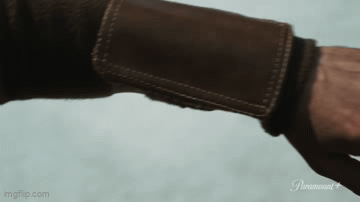
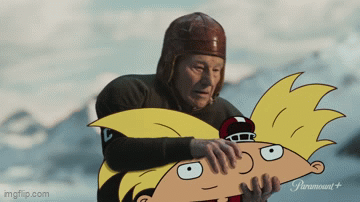


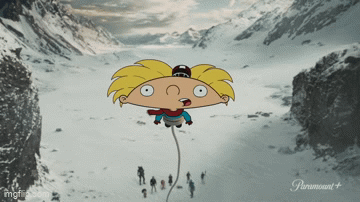
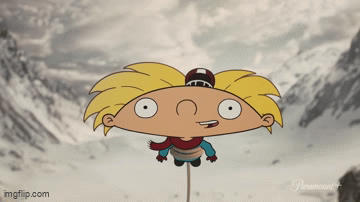
Paramount+ (2024)
In a newly released ad for Paramount+—the streaming service formerly known as CBS All Access—the company continues the odd storyline that all the various characters and stars of different Paramount-owned franchises are climbing the giant mountain seen in the company’s famous logo. This time, a group consisting of Drew Barrymore, Sir Patrick Stewart, Halo’s Master Chief, Arnold, Lt. Dangle from Reno 911!, and Knuckles, among others, are trying to scale a large cliff wall to reach…I don’t know, the next commercial. Miami Dolphins quarterback Tua Tagovailoa is trying to toss a grappling hook up the cliff wall to give everyone a way up the mountain. But he can’t do it. That’s when Patrick Stewart recommends tying the rope to Arnold—who has a football-shaped head—and tossing the animated child at the mountain. At this point, Stewart takes off his jacket to reveal an old-timey football costume and helmet and tells Drew Barrymore to shut up, and Creed starts playing “Can You Take Me Higher.” Folks, I’m not making any of this up. This is a real ad. I feel like I need to step in here and remind you all of that fact. Anyway, eventually Stewart chucks Arnold, after kissing his head softly, up the mountain and…(spoilers!) fails. Arnold slams into the rockface, likely crushing every one of his cartoon bones in the process, and the group hits upon the next beloved character to attempt throwing at the cliff. Some might find this ad funny. And I’ll fully admit that Stewart is doing a bang-up job of being a weirdo old guy with a bad idea. But I also watched this trailer and felt a sense of dread. Companies today don’t see things like Star Trek or Halo as pieces of art made by creators. Instead, they are simply bits of IP that can be tossed into a blender to create some corporation’s next streaming service. Why are these characters hanging out? What do they have in common? Why is this happening? “Stop asking questions,” says Paramount’s marketing team and execs. “Instead, just be amazed and delighted by all the IP and CONTENT we own. Isn’t that rad?” I don’t think so. The continued consolidation of pop culture is actually really depressing. The reality that in 2024 a single company can own so much of our collective art is scary. It seems like 90% of film and TV are owned by Disney, Universal, Paramount, or a few other big players. And if one of them decides to consume another, as Disney did to Fox, even more of pop culture gets shoved into one box owned by one greedy company that can decide, on a whim, to cancel shows, remove movies from streaming services, or use beloved characters as pawns in their content wars. And that all sucks, even if it was funny to watch Patrick Stewart kiss Arnold on the head. Source: Kotaku
(images via YouTube)
15 notes
·
View notes
Text
i was listening to a podcast about the 2002 movie “catch me if you can” (great movie. highly recommend it.) and on the podcast they talked about leo dicaprio and his career and his stardom and i was hit with a critique of leo that the hosts seemed intent on overlooking: when was the last time leonardo dicaprio, one of the few people in hollywood who can greenlight anything by attaching his face to it, lent his star power to a film director who was not already Quite Established?
it turns out that the last time he worked with someone who did not already have an oscar/nomination was r.d. robb’s “don’s plum” which came out in *2001* but was filmed before titanic even, leo and tobey maguire apparently fought against the film’s release, and it made zero money.
but, while talking about leo’s career on the podcast they also talk about other movie stars (toms hanks and cruise specifically) and what they’ve done with the past 20 years versus dicaprio and, yes, leo has consistently worked with seemingly The Best and, for the most part, only makes critical hits but, when you sit down and compare the filmographies of the three, To Me it’s far more interesting that the toms have been able to maintain their star power over the last two decades while still taking risks with their directors — giving new talent, talent in another field like tv or animation, or talent that has been stuck in movie jail — a shot at the big leagues (and people can quibble all they want but, between you and me, live action theatrical films are still the undisputed Big Leagues of hollywood). and, beyond just the films that get made, there are even more stories of the toms using their influence to help first-time directors find a distributor, or fight off over-reaching studio execs, or just being unofficial and uncredited script doctors and producing consultants, for pretty much anyone who asks. those stories just don’t exist with leo. with him there are actually more stories, straight from the mouths of writer/directors, about how leo will be interested in their script but flat out refuses to work with any director who isn’t a big brand name themselves. easier to have a somewhat perfect career when you refuse to take risks.
i’m not actually trying to pit the toms (or any other star — i just talked about the toms in this post because the podcast in question used them as comps) against leo — in the IP era, it’s good that there are still people who can get non comic book movies made. but, it felt disingenuous listening to a conversation about how great a star leo is that refused to confront how safe his career has been. because, if we really get down to it, he never really does what a movie star should. he never lends his face on a poster, his name above a title, to a movie that would not have been made otherwise, to someone who isn’t already in the club. he never does a movie for scale, with the potential for box office points if it does well financially, just so something can get made. maybe leo will change his tune as he ages. i hope so. but, he’s already 48 and by his age hanks and cruise were very much into their current eras of regularly working with new talent and imparting what they learned from the greats to a new generation. there are so few people with his power, his clout, his knowledge that we need people like him to pass it on. i hope he starts passing it on.
#to give this all a very flippant end:#basically tom cruise could do the revenant or wolf of wall street but leo dicaprio couldn’t do jerry maguire or edge of tomorrow#it’s also interesting that leo refuses to audition and had to be dragged in to read some titanic lines for jim cameron#but cruise insists on sitting down with a filmmaker offering him a movie to go over it and see if they would be a good fit together#like one is above the audition process and the other knows that people won’t really let him audition because that’s supposed to be#beneath a star of his caliber so he forces an audition to happen anyway. idk. says something to me.
108 notes
·
View notes